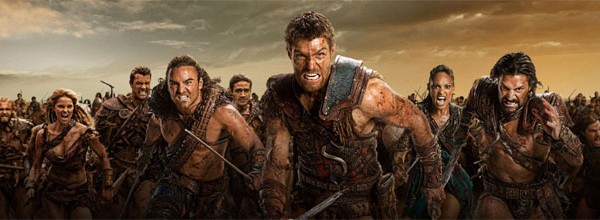This has happened on numerous occasions throughout the show’s run but the theme at the heart of the series has always been “freedom” and this finale, ‘Victory’, provides the most fitting note imaginable to end on. It’s perfect. It’s a glorious achievement, a stunningly realised and searingly emotional concluding hour that sees the rebels fight against all odds for this most elusive of ideas. For freedom.
Being free is about being able to make personal choices and determine your own fate. It is a notion that lies at the centre of what Spartacus is about and it must be noted that every rebel who dies on or off the battlefield in ‘Victory’ meets their end because they have chosen to fight for it. Many fall in the last battle against Rome because this isn’t a series that is interested in rewriting history so much as understanding it. It’s an important detail that the key Roman characters end the show without any real freedom, having to agree with the decisions of somebody more powerful simply because that is how their society works.
When it comes to the story of ‘Victory’, almost all the establishing work has been done in the past two episodes, setting up a scenario in which Spartacus’s army must stand and confront the legions of Crassus if any hope is to be found for those that cannot fight to escape. Before this, the rebel leader uses simple but effective tactics to confuse Pompey as to his location and draw Crassus out to face him on the battlefield. Then, the Roman leader and the legendary rebel meet face to face for the first time and we get to see their similarities and differences laid out.
The ensuing scenes are larger in scale than anything that has ever been done on this show and perhaps bigger than anything on television. It is not simply the visual power of this battle that gets our hearts pounding, though, it is the sheer emotional weight that comes with it, the knowledge that most of the characters will die because they have finally come up against the enemy they cannot defeat.
Spartacus still has surprises to deliver, though, and this is by no means a decisive Roman victory or even necessarily a victory at all. The show’s titular hero provides a poetic redefinition of victory in the context of his situation, declaring that grasping freedom has made them victorious. The idea is stronger than Rome, and it cannot be killed. Now that the idea has spread so widely, it doesn’t matter how many Romans or how many rebels die, freedom is victory. It’s appropriate that some of Spartacus’s final words are that, “There is no greater victory than to fall from this world a free man” – he understands that the idea is more influential than his war against oppression.
Spartacus is just one of the numerous main characters to die in ‘Victory’, proving himself a more capable warrior than Crassus in one of the show’s most tense combat sequences before being speared by Roman soldiers. When all is lost, Agron moves him away from the battle, fulfilling the accepted historical belief that Spartacus’s body was never found. His final moments are a wonderful tribute to an enduring character who becomes a symbol for the value and importance of freedom.
The development of Gannicus throughout the season is revealed to be in service of an equally appropriate demise for one of the show’s most beloved characters. It’s essential to note that he, like Crixus, could not be killed in one-on-one combat. Caesar hides behind legions after trying to best the God of the Arena and not succeeding, revealing himself to be a coward when faced with a true champion. Gannicus, then, painfully becomes one of many crucified on the Appian Way. In his last moments, he sees the arena and Oenomaus, and he is at last able to join his brother in the afterlife.
Before we reach those climactic deaths, Lugo, Castus, Naevia, Saxa and others die in the fight against Crassus’s army. This has never been a series afraid of killing off many main characters to show how much is lost and the cost of this war really hits home as we see just how many of the characters are damned. Of the central figures, only Agron, Nasir, Laeta and Sibyl survive, providing a resonant conclusion in which the final living member of the uprising in Batiatus’s ludus gets to live as a free man.
Everyone involved with Spartacus deserves huge credit for this tremendous finale and the many impressive episodes that came before it. Steven S. DeKnight and his writing staff are on top form, crafting the best way for this show to possibly end. The visuals and stunt choreography are also terrific, with director Rick Jacobson executing what it unquestionably his most effective work on the show so far. The actors also all perform with real skill and assured presence, here’s hoping many of them find decent work now that the show is over, they deserve it.
In the end, it’s clear just how much Crassus has sacrificed as he crucifies the woman he loves because it is what he “must” do. He may have just found a route to power but he has lost even more freedom in doing so. The deaths of the many rebels aren’t as heartbreaking as they might have been because they remain free.
It’s a tragic but familiar note to end Spartacus on, recognising that freedom allows for victory to be found in death, because the idea is worth dying to uphold.
![]()
Aired at 10pm on Monday 8 April on Sky1.
> Buy Spartacus: Vengeance on DVD on Amazon.
Watch the trailer…
What did you think of the episode? Let us know below…

